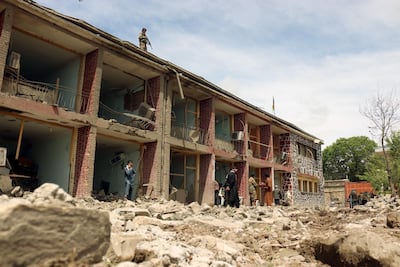Fresh evidence that radical groups like the Muslim Brotherhood are seeking to exploit the coronavirus pandemic is a reminder that, despite the setbacks they have suffered in recent years, Islamist extremists are actively seeking to regroup.
Prior to the coronavirus outbreak, supporters of the Muslim Brotherhood, Isis and others were very much on the defensive, not least because of the catastrophic defeats they had suffered in Iraq and Syria following the collapse of the so-called caliphate.

There were also indications of similar setbacks elsewhere in the Muslim world, with the Taliban under pressure to sign a US-sponsored peace accord in Afghanistan and the Islamist-backed Government of National Accord in Libya in danger of succumbing to the military offensive being undertaken by Field Marshall Khalifa Haftar.
But with global attention focused on dealing with the coronavirus challenge, there is mounting evidence that Islamist hardliners are seeking to use the pandemic to recruit and rebuild their networks.
As The National reported earlier this week, in Britain experts have raised concerns that the lockdown has enabled the Brotherhood to spread its ideology directly into the homes of potential sympathisers.
Concerns about such activities have been highlighted in a report written earlier this month by Andrew Silke, Professor of Terrorism Risk and Resilience at Cranfield University, and backed by the Pool Re insurance group. A paper entitled Covid-19 and terrorism: assessing the short and long-term impacts of terrorism concluded that Islamist extremist propaganda was focusing on the vulnerability of governments distracted by the pandemic and the opportunity this presented for planning future attacks.
The report found that there has been a significant increase in online extremist activity in Britain that has raised the risk of increasing short-to-medium term radicalisation. This means there are strong, long-term concerns that states weakened by the serious economic consequences of the pandemic, both in the Arab world and beyond, “are likely to be more vulnerable to the emergence/resurgence of terrorist groups in many parts of the world”.
Commenting on the report, Prof Silke remarked that “while lockdown measures may represent obstacles to terrorists, many terrorist groups have also flagged that the pandemic has left government and security resources severely stretched…As a result, the ability of government, intelligence and law enforcement agencies to focus on traditional priorities such as counterterrorism has been undermined.”
The findings of Prof Silke’s report have received backing from Dr Alan Mendoza, director of the Henry Jackson Society, who warned that there was a danger groups like the Muslim Brotherhood could take advantage of encrypted video-conferencing applications like Zoom to broadcast the group’s extremist ideology straight into people’s homes, especially as the focus on dealing with coronavirus meant there was “a much-reduced ability to police them. Who knows what is said in a Zoom conversation?”
The determination of extremists to exploit the internet to proselytise its radical ideology was highlighted last year after it was revealed that a foundation set up by Yusuf Al Qaradawi, the Muslim Brotherhood’s spiritual leader, had launched an application designed to recruit new supporters. The Euro Fatwa app, which was created by the European Council for Fatwa and Research, based in Dublin, has been described by European security officials as a “dangerous hate app” specifically designed as a radicalisation tool for the Muslim Brotherhood.
Concerns about the attempts by the Brotherhood and other Islamist extremists to expand their support base in Britain have prompted MPs to raise the issue in parliament. In response to a question from MP Andrew Rosindell, James Cleverly, the Minister for the Middle East, said the British government took the concerns seriously and was keeping the activities of the Muslim Brotherhod and its associates overseas under review.
“We monitor closely the risk that any movement might seek to take advantage of the Covid-19 pandemic to spread their influence, exploiting this unprecedented global health challenge to target vulnerable people and communities,” he said.
The upsurge of Islamist activity in Britain reflects trends taking place throughout the Muslim world, with growing evidence that Islamist extremists are exploiting the coronavirus outbreak to rebuild their terror networks.
This week’s deadly spate of terror attacks in Afghanistan, for example, has been widely blamed on militants linked to Isis. At least 24 people are now reported to have died following a militant attack on a maternity ward in Kabul, with mothers, newborn babies and nurses among the victims after gunmen opened fire on Tuesday at the Dasht-e-Barchi hospital in the capital. At about the same time, 32 people were killed when an Isis suicide bomber attacked a funeral in Nangarhar, in the east of the country. The attacks come at a time when US-sponsored efforts to end the conflict have stalled, with President Ashraf Ghani responding to the attacks by ordering Afghan security forces to resume offensive operations against the Taliban.
Turkey’s intervention in the Libyan conflict is another example of the revival in the fortunes of Islamist extremists. The tide of the conflict has turned in the GNA’s favour since the intervention of Turkey, which, together with Qatar, is one of the Muslim Brotherhood’s main backers.
By sending groups of Syrian mercenaries to Libya, Ankara has managed to prevent rebel forces under Field Marshall Haftar from seizing control of Tripoli, a feat that will no doubt be used by Islamist extremists to show that their cause if far from lost.
Con Coughlin is the Telegraph’s defence and foreign affairs editor


